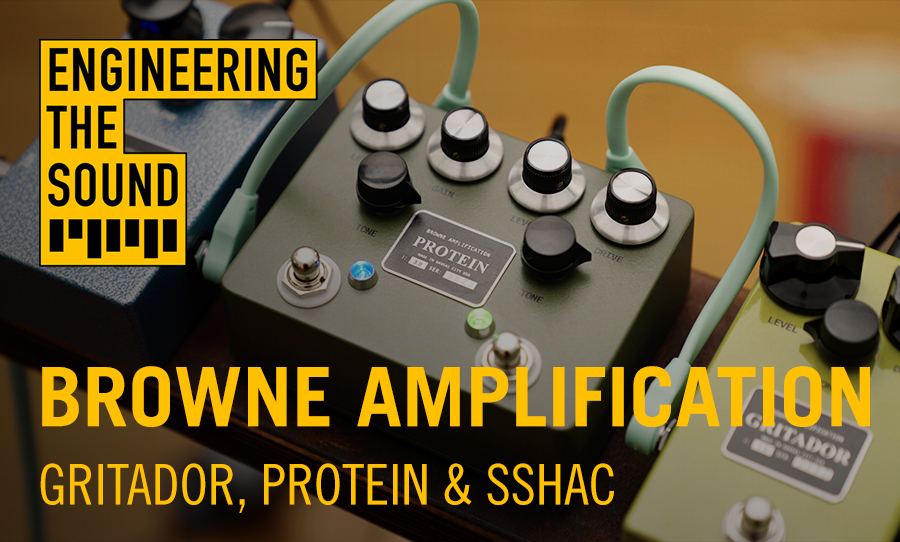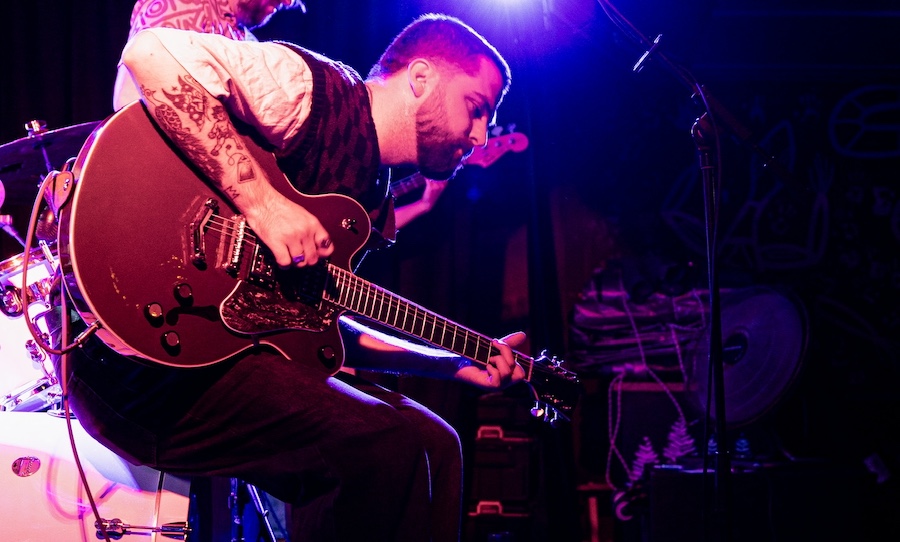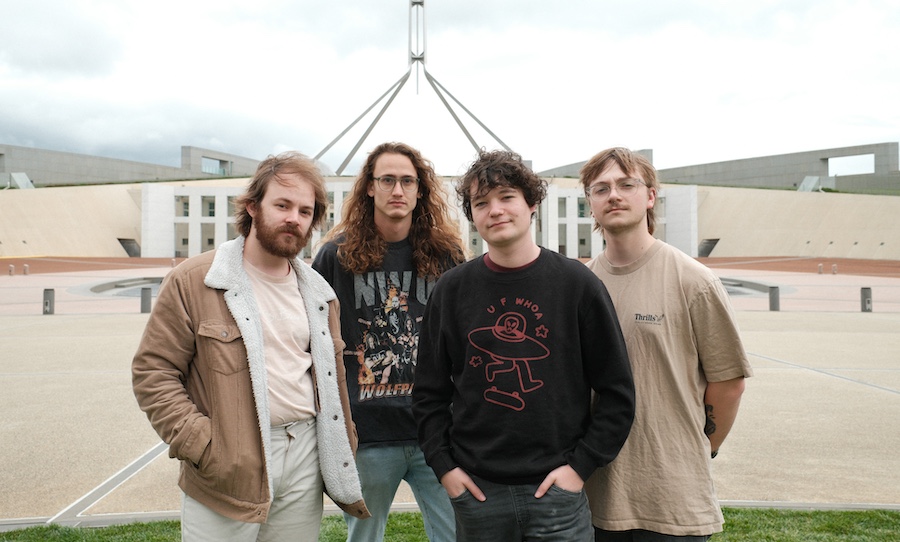As one of Australia’s leading artists in the global hyperpop movement, Banoffee doesn’t subvert the ‘popstar’ narrative, but instead moulds it in her own image.
Since the release of her groundbreaking debut LP, Look At Us Now Dad, the Melbourne artist has become renowned for her sombre take on the experimental, saccharine-sweet genre we now know as hyperpop. However, unlike her other contemporaries across the globe, Banoffee rejects iron-clad irony, in favour of rawness in all its forms.
Her latest single, Tapioca Cheeks, boils this idea into its most concentrated form yet. A sonically sharp, yet lyrically moody ballad about the dissonance of love. Needless to say, 2000s emo-rock is not dead, but simply reincarnated.
In light of this impressive release, Happy got the chance to sit down for an incredible Zoom chat with Banoffee, to discuss the intricacies of pop music, the evolution of Aussie experiments, and life inside a moon boot.
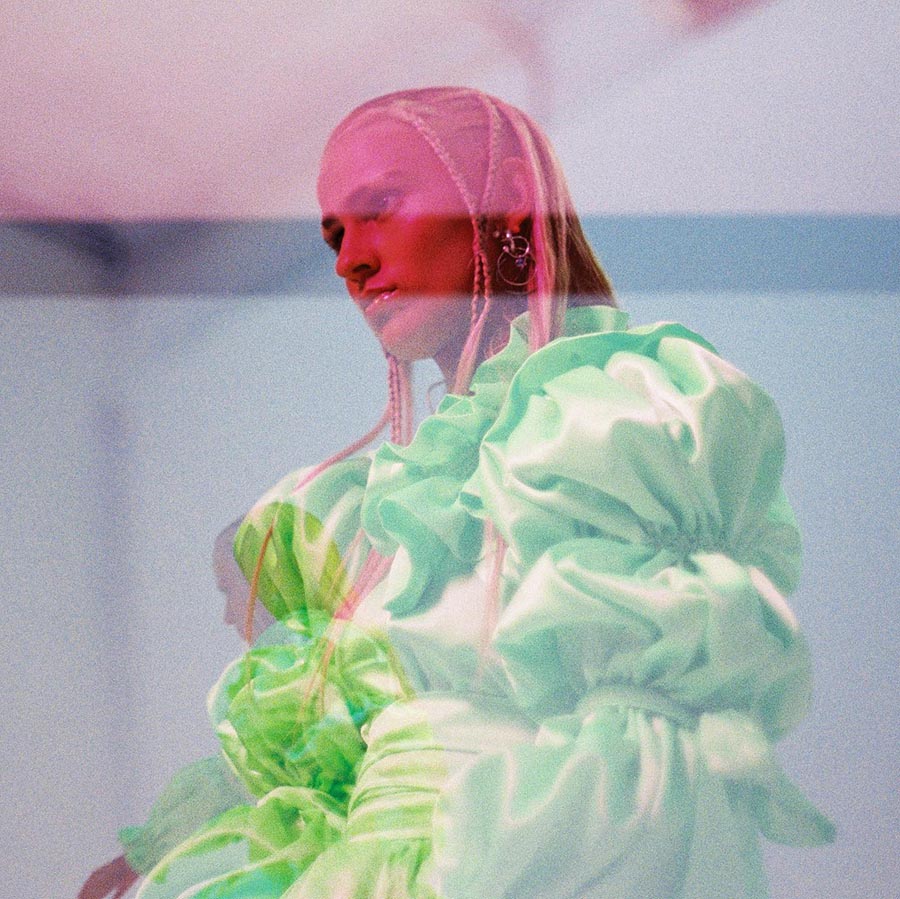
HAPPY: Hey! How’ve you been today?
BANOFFEE: Yeah, I’ve been alright, been better actually. I broke my foot recently so that’s been shit! But I’m OK.
HAPPY: How did you break your foot?
BANOFFEE: I fell down the stairs in my house. We have like these epic stairs, and I got up in the middle of the night to go to the bathroom and I fell down them.
HAPPY: Oh my God! On the weekend?
BANOFFEE: Like two weeks ago. So yeah, I went to a GP who told me that I should… that it was just like a bruise and I should just exercise on it. So I went on a 15km walk, I was like going to the gym. I was like, ‘this feels wrong’, went in there, and it’s like, ‘Your heel is completely fractured.’
HAPPY: Oh no. Horrible!
BANOFFEE: Very silly.
HAPPY: Very silly. It’s not funny, but it is just a smidge a bit funny.
BANOFFEE: It’s ridiculous.
HAPPY: It’s ridiculous.
BANOFFEE: Trust me. I’m one of those people like, ‘Oh, it’ll be fine.’
HAPPY: ‘Walk it off.’
BANOFFEE: And they’re like, ‘Cool. Your heel’s shattered. Can’t you feel it?’ I’m like, ‘I guess so.’
HAPPY: Oh God. That is disgusting. Oh, I’m so sorry.
BANOFFEE: It’s all good. Thank you for having me.
HAPPY: No, thank you for chatting to me. I’m a giant stan, so this is a bit weird because I’ve never interviewed someone that I stan.
BANOFFEE: Yeah, right.
HAPPY: Do you mind if, I guess, we sort of jump into it?
BANOFFEE: Sure.
HAPPY: So I guess, your music definitely falls within that hyper pop category. And I feel like you’ve associated yourself with a lot of artists in that sort of hyper pop sphere. What made you want to get that into that sort of experimental production.
BANOFFEE: I’ve always… I guess, like since I was young, like a lot of the music I listen to is always sort of, I guess, a little left of centre in terms of production. Arthur Russell was like a big hero for me when I was young, and Laurie Anderson and a couple of those sort of like people who sort of paved the way in more experimental, electronic – you know, that mix between an experimental. And then I heard SOPHIE’s EP, BIPP, forever ago when it came out, and that was like a really important record for me. That’s when I started getting into that sort of overly sweet, sort of sugary production. Hannah Diamond had brought out… it must have been one of her first releases – it was that pink and blue song. And I remember when it come out, I was like, ‘Fuck. This is insane.’ So those two things sort of changed my direction a bit. I was very inspired by that. And then I sort of, yeah, mixed my own folk and country sort of background in with those new influences. And Banoffi sort of turned into what it is.
HAPPY: Yeah, I mean it’s fucking insane. And Tapioca Cheeks is fucking insane.
BANOFFEE: Thank you.
HAPPY: I just wanted to ask, just because there’s clearly this weird sonic evolution… I hate using that term, but I feel like that’s the only way I could describe it. But, what have you done differently with Tapioca Cheeks compared to everything else?
BANOFFEE: There’s a lot more vocal processing on Tapioca Cheeks than some of my earlier work. I think it’s also because it’s a collaboration. You know, normally I’m sort of producing things myself, and then getting other producers in to like, work with whatever I made. Whereas Tapioca Cheeks, I went into the studio to write, and like I went in with Planet 1999, and they had like a two-bar loop, and we wrote Tapioca Cheeks over the top and then produced it out from there.
But it was like, way more of a collaboration. It’s actually one of the fastest songs I’ve ever written. I think we did it in like twenty minutes – it was like, really stupidly fast. It just like, came out. Also, what I really like about Tapioca Cheeks for me is it’s the first vocal take. Like, we didn’t re-sing it, I thought of the lyrics, we sung it, and then we kept them. And I think that you can sort of feel the emotion a lot more because of that. But yeah, the vocal processing I think is really different to what I’ve done before. Like, the chorus is so different to any of my vocals on the past record, anything I’ve done before. And that’s really down to Charles, who produced the vocals in the chorus, and he really just like flipped them and played with them in ways I hadn’t really thought of before, so it was really fun, like getting someone else’s thoughts on what I could do sonically.
HAPPY: I also think it’s really interesting, it sounds a lot cleaner and bright than Look At Us Now Dad. I don’t know if I’m reading too much into that, but is that something that you’re looking to go down towards with your future projects? Is this a theme that’s going to come up in your next body of work?
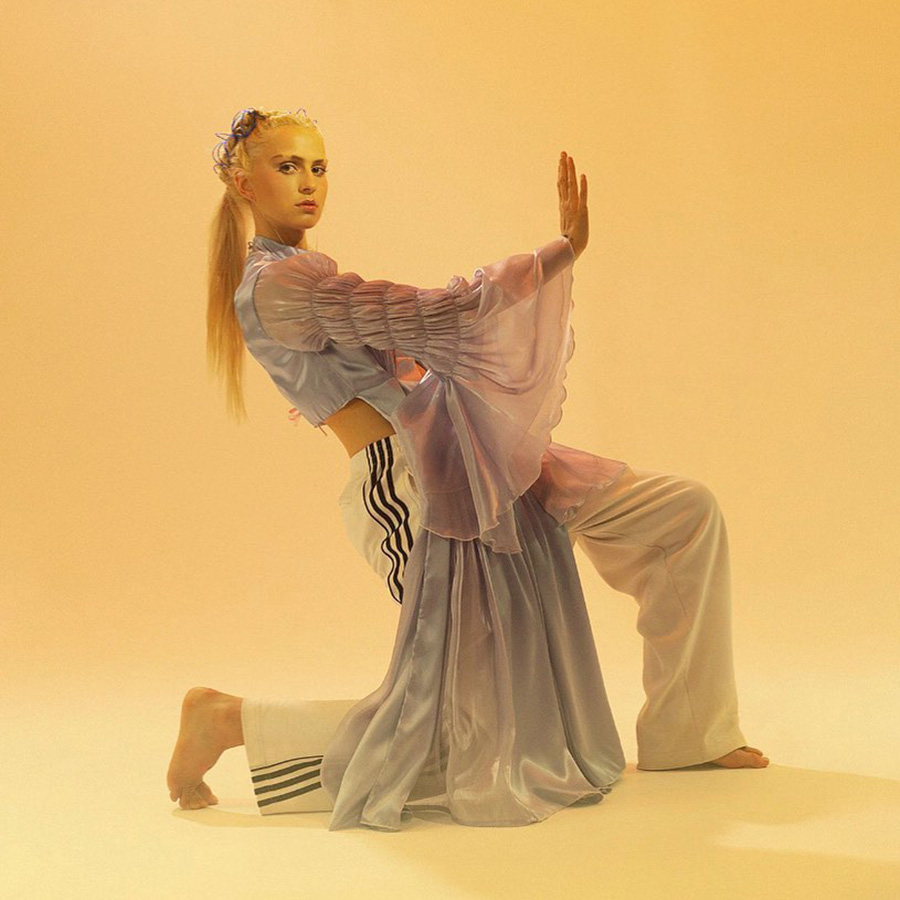
BANOFFEE: It’s about how far. There are some really clean pop songs on that. I think there are a couple of artists of the past maybe five years who have really influenced the way I write music. And also, have made me realise what I like in pop music. I think Julia Michaels is an amazing writer and singer, and I like the way she sort of crams full sentences and descriptions into melodies.
Yeah, she has so many lyrics, as I always have so much to say and I’m always cutting it down. And I think I’ve realised I don’t have to cut it down as much. If I keep the vocal really clean, it’s like, ‘We can’t hear what you’re saying’, and I’m like, ‘Well, you can, just don’t put distortion on it.’ So yeah, the record coming up, it does have a lot of those sort of clean lyrical songs, and then some pretty grungy moments as well.
HAPPY: Yeah! I think everything that I’ve read about you has always described you as a singer-songwriter, but I actually didn’t know that you also had a hand in literally producing your own work, where you created it yourself. I think it’s interesting. Why would that be ignored?
BANOFFEE: Probably because I’m a woman. I think when you sing, people assume that you… that’s the only thing you do. I think that has a big part of it. I’m also not someone who’s ever going to put a song out saying, ‘Hey guys, I produced this’. Because if I had help, I have someone working with me on it, the benefits for them are so much shittier than mine.
They get a couple of production points and some terrible fee that I can afford to pay them. And I feel like it’s really important to me to highlight them. And yeah, I do do a lot of production, and that’s what I do all day, every day. I’m on my computer making songs. But no one’s really… I don’t know why, but no one’s really ever been that interested in it. And the people who are, I think often sort of like to pigeonhole me and ask very sort of generic questions about like what’s it like being a producer as a woman and stuff. And I’ve always like sort of palmed those questions off, because I’m a bit like… I can’t. It just minimises you so much. So I think potentially through me sort of avoiding some of those questions. And also, just wanting to highlight the work that other people do do on my record, potentially on the production side that slips under the radar a bit.
HAPPY: Yeah. I think that’s interesting, how you’re… I don’t want to mansplain your own existence to you, but you are quite self-aware of the position that you’re in. I guess it’s that self-awareness that I feel carries throughout all of your music and especially there’s that lineage of you sort of unpacking trauma. How does self-awareness inform your songwriting?
BANOFFEE: A lot. It’s funny. It’s something I get told quite often by my friends is that I’m very self-aware, but I think that I must be in some way to be like a front for all of the fucking mess behind at all. I think it influenced my song writing because I really started writing music as a way to deal with a lot of mental health issues. So, me sort of learning more about myself emotionally just went hand in hand with writing music. And so, it’s always come out. It’s always been like a little bit of a vice for me. But more than that, I think I got really tired of hearing like surface level music. And I just don’t believe that passion music has to be meaningless or shallow. And I think like a lot of the songs that I love might appear shallow – some of the Dua Lipa stuff that’s come out, very simple lyrics, but there actually is a little bit of depth to them.
And then there’s stuff that you sometimes hear on the radio, and you’re like, ‘Oh, my God. I think I’ve heard this before.’ And I don’t believe that they have to go hand in hand. So, I think it’s been a real sort of concerted effort for me to make sure that my songs are a little deeper, more because like, I get a lot of satisfaction when people find value in my songs and come to me and talk to me about them. And, you know, some of the artists that I really admired when I was like a broody young teen were like Fiona Apple, who has never said a shallow thing in her life. You know, a dinner conversation with her would be so dense, you know. She just doesn’t do anything else. And I’ve always been like, ‘That’s what I want to do. I want to write songs that are interesting, and potentially have layers that people can explore.’

HAPPY: Yeah, well, I think that’s definitely how I feel listening to your music. It’s one of those things I feel like you just keep coming back to. And there’s always something new in there. And it’s the same for your visual art as well, especially with Tapioca Cheeks. I just wonder how you have the song, which feels like heartbreak, but you also have a video which… hurts! I just want to know how you did that?
BANOFFEE: (laughs) It was really funny because I wrote Tapioca Cheeks when I had first fallen in love and I was like, so deep in, you know, and the person I was seeing at the time had had this freak out about not being good enough and all these things. And normally that would scare me about a person. But I was like, how can you make me even more obsessed with you? Insane. And then I went to film the video, COVID had happened, world had fallen apart, we’d split four days before I was supposed to film the video. And I was like, ‘What the fuck? This is so messed up.’ But luckily for me, like, I can’t help it sound sad, even when I’m happy, which is quite sad. Like it sounds sad even though it was a love song to begin with. So I came up with the video.
For me, I think that like any type of love is always equal parts of completely excruciating and fucked, and also amazing, like even when going well, it’s really scary and sucks. You know, I feel like I can’t concentrate on anything. You totally hijacked my life. For the video for me, I wanted it to be this sort of juxtaposition of sickly sweet in the colours and the lighting and everything, so dream-like, but this person, I guess, I can’t help the love hearts and shit that come out of my body. I wanted it to be like, I think I’m in control of this, but it’s just coming out me and I’m bawling my eyes out. And I wanted it to be a little bit of like, ‘Yes, maybe you split or you’re still together’, feeling anything at its full capacity can be like completely freeing and completely imprisoning at the same time. That’s what I wanted to do.
HAPPY: I felt that. I felt that way too hard. I guess, and this is a very abstract question. But I guess how do you put out that emotion? Is this something that you sort of plan out, or is it just one of those things where you’re just doing what you’re feeling, and it’s actually just resonating with other people as you go?
BANOFFEE: I mean, it was choreographed, and the treatment was written very specifically. But in terms of on the day, it really is just about like seeing what happens. I turned up very aware that I might bawl my eyes out on camera, and I knew that if I did, it would be great. We’ll go with it. And there was also a chance I was going to be completely numb and not be able to give much.
And I thought, ‘Well, that’ll show as well. And that would be great, too.’ And I think it’s just about like, the people I work with. I worked with Amy Deller, who’s an incredible cinematographer, and Phoebe Schmidt, who choregraphed it with me, and they’re both so good at what they do that I just have to trust that whatever I was feeling on the day, they would make the most of it and make it really work. But yeah, it is hard like that video was like a nine hour shoot, and my knees were like bleeding because it was concrete.

HAPPY: Fuck.
BANOFFEE: My knees were like, covered in blood and we had to keep wiping my knees down. It was insane, but it was like I think, because it was so painful, you can sort of see that in it. It was funny, because when we did it, I thought I’d cooled off and was A OK, but I watched it, and was like, ‘God, I’m miserable.’
HAPPY: But it works. This was something someone brought up that I thought was interesting. But I think you’re one of the big figures right now of the Australian electronic experimental music scene, which is rather small. I just sort of wanting to pick your brain, why isn’t the Australian music scene really catching up with Europe, or with America?
BANOFFEE: I have no idea. That’s a hard one! It’s a hard one for many reasons. You know, there was an article a while ago listing like, the new hyperpop faces of Australia. And I just thought, ‘hyperpop has been around forever’. Like, it really came out in 2017, and to be honest, and Mons is probably gonna be like ‘shut the fuck up, nobody gives a shit’. But like, people were absolutely gagging for that genre in other countries, but in Australia it just was so niche. And I think that it’s really taken a good… what, four years for that genre to be able to develop here. I think a lot of that is to do with potentially just the attitude here, which is actually pretty beautiful, that, like, you don’t have to be big in order to be successful.
That you can enjoy making your art, and doing it on a small scale, and like have another job and just like do it for the love of it, so people aren’t potentially as ambitious as other countries where they like really like, that’s their whole life. There’s no plan B, you’re screaming whatever you’re making from the rooftops. Yeah, there’s so many bedroom producers here and so many sort of like little sub-genres, but the scenes are fifty to one hundred people deep. I’m not sure why these sort of genres have taken so long here, but I know that now it is sort of blossoming, it is getting a lot of attention. Like a lot of the people I work with in the states are hearing about the artists here and are super excited about them. I think that the people who are ahead of the curb, are absolutely on par with the rest of the world, if not more advanced, because they’re so insulated and it’s all they’ve got. Yeah, but it’s just interesting that Australia takes a little while to catch on in certain areas. It could potentially just be that people here aren’t into the sort of music we’re making.

HAPPY: (Laughs) Which you know, we’ll ignore.
BANOFFEE: Yeah. I was like, ‘Well, I’ll just keep going. Eventually, someone’s going to listen. I’ll just keep making it.’
HAPPY: Yeah. That’s sort of really wraps up all the questions that I had. I’m also a little bit dumbfounded. Um, I just wanted to ask, is there anything you want to add in anything, or anything I haven’t touched on that you think is important?
BANOFFEE: No, I think you did a good job. I really liked your questions.
HAPPY: Well, thank you so much. Shucks. Thank you so much for chatting to me. Be safe. Enjoy the cold.
BANOFFEE: Thanks for chatting to me. You’ve broken up my day of sitting around with this moon boot on my leg.
HAPPY: Girl. Oh, my God. I’m praying for you and your poor foot.
BANOFFEE: I’m going to make it fashion. There’s got to be a way.
HAPPY: Moon boot, but cute.
BANOFFEE: There’s got to be a way.
HAPPY: Get it bedazzled. Yes!
BANOFFEE: Yes! Nice to meet you! What city are you in?
HAPPY: I am in Sydney right now.
BANOFFEE: I’m sure I’ll meet you sometime soon. I’ll be up there soon as I can be!
HAPPY: I would really like that. That’ll be lovely!
BANOFFEE: Oh yeah. Come to the show on the 26th.
HAPPY: Yeah, I actually am!
BANOFFEE: Great! Please come up!
HAPPY: Thank you. I really appreciate that. I’ll speak to you soon. Be safe. Make good choices.
Tapioca Cheeks is out now and available on all streaming services!
Interview by Mike Hitch
Photos supplied via press and Facebook.

